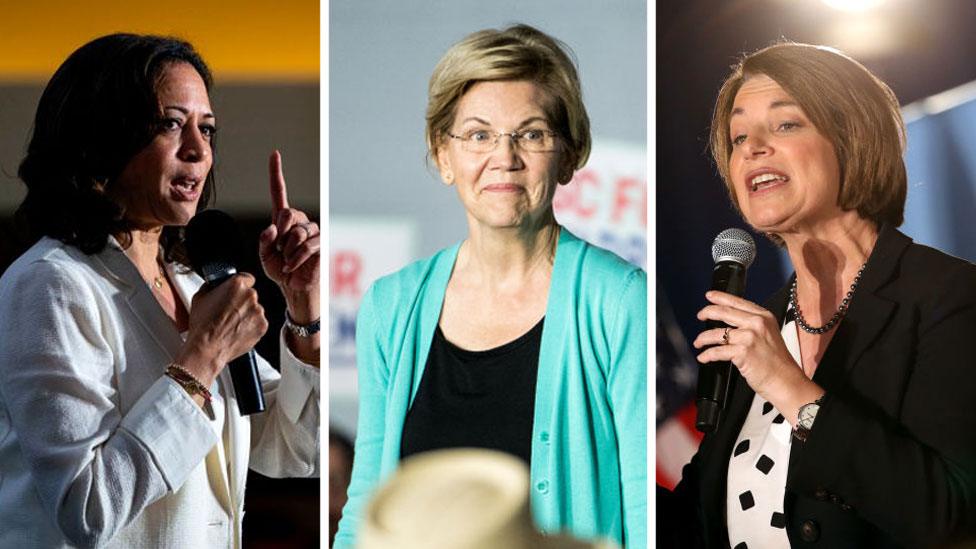Democratic debate: The winners and losers
- Published
Joe Biden's rambling answer about record players raised eyebrows - but who had the best one-liner?
The warm-up rounds are over. For the first time, all the top Democratic presidential candidates were on the debate stage together and the results were crackling.
No more theoretical discussions of how candidate x on day one looked compared to candidate y on day two. No more sparring with lower-tier candidates who served as surrogates for stronger candidates not in the room.
No more Queensberry rules of boxing. It was - at times - a bare-knuckle affair.
Here are some key takeaways.
Rambling Biden
When you're a candidate facing doubts about your age, maybe it's not so helpful to reference outdated types of audio equipment in your answer.
"We bring social workers into homes of parents to help them deal with how to raise their children," Joe Biden said at one point toward the end of the debate.
"It's not that they don't want to help - they don't know quite what to do. Play the radio, make sure the television, excuse me - make sure you have the record player on at night, the, the - make sure the kids hear words. A kid coming from a very poor school, er, a very poor background, will hear four million words fewer spoken than by the time they get there."
Believe it or not, that was Biden's answer to a question about the legacy of racism. It also included an insistence to the moderators that he be allowed to keep talking and a tangent about Venezuela and President Nicolás Maduro.
It was unfocused, meandering Biden at his debate worst.

Steady and strong Joe
By and large, however, Biden probably had good enough debate to hold onto his high poll standings. He started strong - when viewership is highest - but as with the second gathering in Detroit, he seemed to flag a bit as the evening dragged on. He stumbled, for instance, when pressed about his vote in favour of the 2003 Iraq War.
Then he seemed to pull it together down the stretch, turning a question about professional setbacks into heartfelt reflection on his personal losses - of his wife and two children in a car accident and of his adult son to brain cancer.
"The way you deal with it is finding purpose, purpose in what you do," he said - in a way that probably reminded many Democrats of the wounded but strong man who suffered through Beau Biden's cancer in 2016.
Unlike Detroit, Biden wasn't as much of a rhetorical punching bag this time around. He took the sharpest attacks from Julián Castro, in what was perhaps the most jarring exchange of the evening.
The former Obama cabinet secretary accused the former Obama vice-president of "forgetting already what you said just two minutes ago". For the first time a candidate all-but-directly questioned the 76-year-old Biden's mental faculties.
Whether or not the jabs leave a permanent mark - and whether, if it does, it helps Castro - the glass has been broken. And if Biden is struggling at times in a 10-person field, where candidates get extended lulls to regroup, how will he do when the field really narrows?
And how would he hold up in a head-to-head match with Donald Trump, after more than year more on the campaign trail?

Healthcare in focus - again
The first topic of the evening, as it was during the earlier debates, was healthcare - an issue polls regularly show ranks high for American voters.
The fault line within the Democratic Party currently sits between candidates who want to do away with private insurance in place of a nationalised health system and those who want a "public option" that competes with private insurers.
That source of friction was on full display Thursday night. Biden, sandwiched between the progressive duo of Elizabeth Warren and Bernie Sanders, sparred with them both.
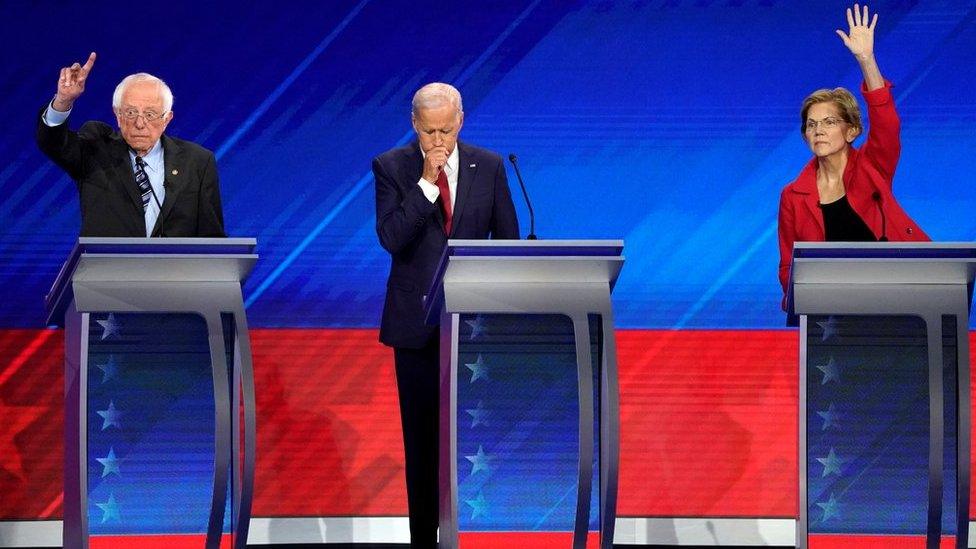
Regarding Sanders's assertion that businesses will give savings back to workers from not having to pay their insurance, the former vice-president quipped: "For a socialist you've got a lot more confidence in corporate America than I do."
He wondered aloud how any of the progressive candidates would pay for their sweeping plans.
Between Sanders and Warren, the latter offered the most skilful response. Sidestepping questions about whether her plan would raise middle-class taxes, she said the issue was the costs of the current system - in insurance premiums, out-of-pocket deductibles and medical care forgone because of the expense.
"What this is about is making sure we have the most efficient way possible to pay for healthcare in this country," she said.

The Warren-Sanders alliance holds
One notable takeaway from that healthcare exchange - and the rest of the debate that followed - was that the apparent non-aggression pact between Warren and Sanders is still in effect.
Numbers two and three in the polling (who is which depends on the survey) might benefit from the other being knocked down a peg, but neither candidate seems willing - or able - to be the one who does it.
Those on the left who watched the debate Thursday night probably couldn't help but compare the two, however. Sanders offered his familiar fare - albeit in a voice that appeared on the edge of succumbing to hoarseness. Warren once again seemed focused and sharp - able to speak from personal experience on frequent occasions, then play the big-picture policy wonk when necessary.
The woman who turned down a college debate scholarship to marry her high-school sweetheart once again showed she has rhetorical skills.

A re-energised Beto
For the first time in a Democratic debate this year, gun control received an early and thorough discussion. The reason was tragedy - two mass shootings in Texas and one in Ohio. For the first time in years, however, Democrats were talking about aggressive new gun-control proposals - and none were doing so more vocally than Beto O'Rourke.
The former congressman from El Paso, the location of one of those mass shootings, has called for expanded background checks for gun purchases and new restrictions on assault weapons - something all the candidates on the stage agree with. He's also advocated mandatory buybacks of the banned weapons - something he's the only one pushing. And he was very blunt.
"Hell yes, we are going to take your AR-15, your AK-47," he said to applause from the debate hall.
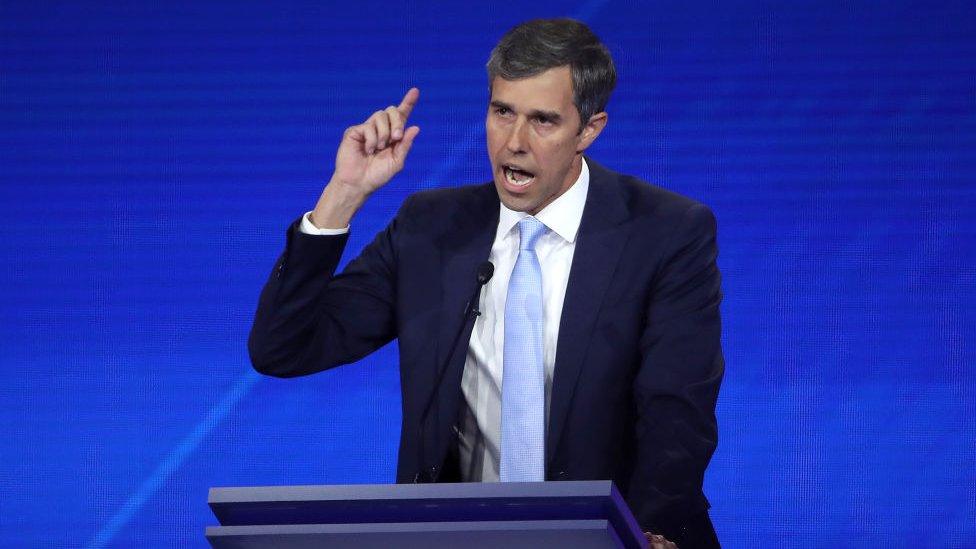
In the past, that sort of sentiment was seen by many Democrats as political poison. It still is controversial. And yet the topic of gun control has given O'Rourke's campaign an energy and vigour that was lacking amid his slow descent in the polls since he launched his campaign with much fanfare.
"A racism and violence that had long been a part of America was welcomed out into the open and directed to my hometown of El Paso, Texas, where 22 people were killed, dozens more grievously injured by a man carrying a weapon he should never have been able to buy in the first place, inspired to kill by our president," O'Rourke said in his opening statement.
There's no guarantee O'Rourke can change the trajectory of his campaign at this point. But past debates have not been kind to the Texan. At least for one night, he stood out in a good way.

Looking for daylight
The Democratic Party's decision to cut the debate field in half this month presented some of the mid-tier or lower candidates with a very clear conundrum. Now that they were on the stage with all the campaign heavyweights, how could they possibly break through?
The answer, by and large, was they couldn't. O'Rourke had his moment on gun control. Castro took the fight to Biden. The rest? Well, they tried their best.
Businessman Andrew Yang announced a contest where his campaign would give 10 families $1,000 a month for a year - a trial run, he said, for his proposed government-funded basic income.
Andrew Yang's debate surprise - a giveaway to random families
Kamala Harris, eschewing the kind of attacks she launched in earlier debates, tried jokes. Amy Klobuchar, when she wasn't knocking down Sanders' healthcare proposal, went with Apollo 13 and Day After Tomorrow film references.
Pete Buttigieg took the adversity question first posed to Biden and turned it into a personal reflection on coming out as a gay man in public office. Cory Booker once again had a solid, personable performance - the kind of affable charisma that has gotten him exactly nowhere so far in the campaign.
It's four and a half months before the first presidential nomination ballots are cast. That seems like a long time. But for candidates searching for political oxygen, the day of reckoning is fast approaching.

Who will take on Trump in 2020?

- Published13 September 2019
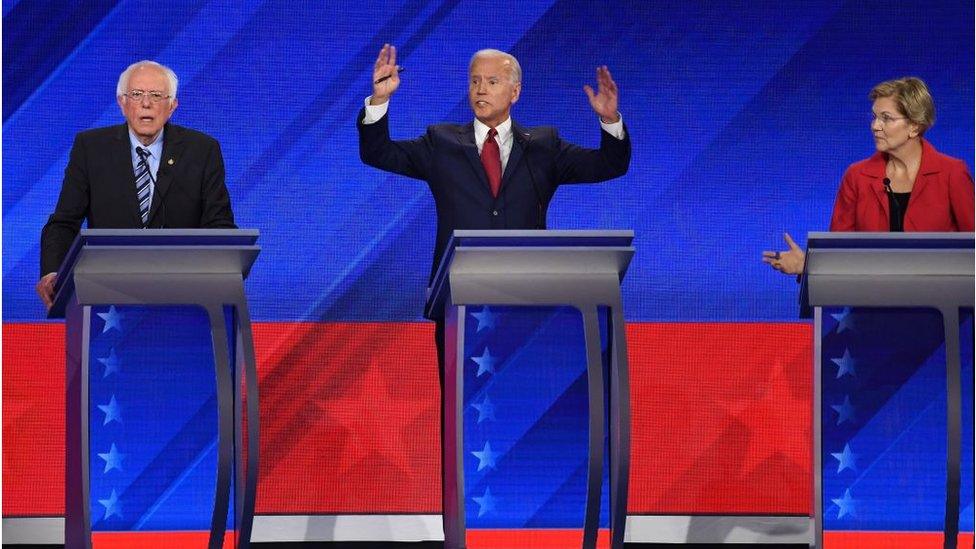
- Published21 August 2019
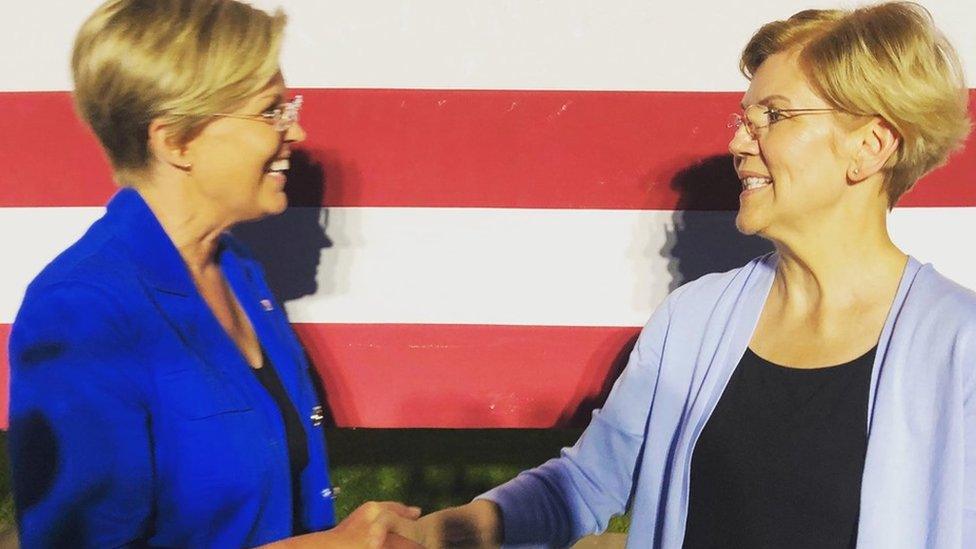
- Published11 September 2019
